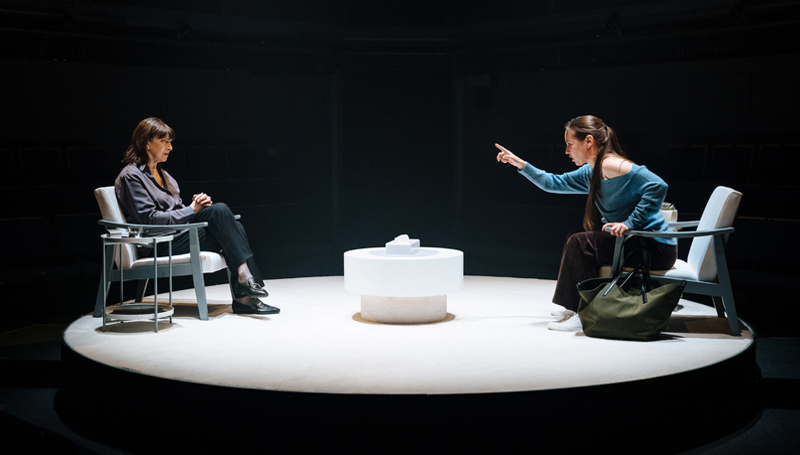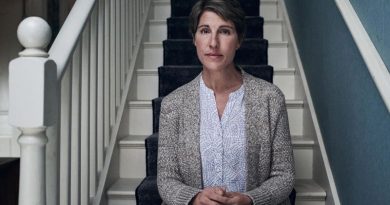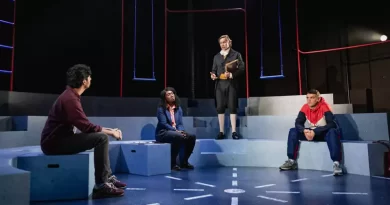“Duet for One”, Orange Tree Theatre
Neil Dowden in south London
19 February 2023
Tom Kempinksi’s 1980 drama Duet for One is an intense two-hander revolving around issues of disability and therapy. A high-achieving classical violinist recently diagnosed with multiple sclerosis meets a psychiatrist as she struggles to come to terms with the end of her playing career which has been central to her life. The play was allegedly influenced by the true story of world-renowned cellist Jacqueline du Pré, who had to stop performing due to MS aged only 28.

Tara Fitzgerald as Stephanie.
Photo credit: Helen Murray.
Stephanie Abrahams has been advised by her husband (a celebrated postmodern composer – similar to du Pré who was married to conductor Daniel Barenboim) to go and consult Dr Feldmann about her depression brought on by her “creeping paralysis”. At first Stephanie is full of defensive sarcasm, making it clear that she wasn’t keen to come and doesn’t think the doctor can help. She and her husband own a house in Tuscany in addition to one in St John’s Wood and can afford to make the necessary adaptations as well as pay for assistance – not to mention the doctor’s services which apparently costs £300 a time.
Stephanie says she is going to take on students and work as her husband’s PA. But sensing that her client is evading emotional truth, Feldmann is not to be fobbed off, and after finding out she has suicidal thoughts she prescribes antidepressants.
Over the course of six sessions Stephanie’s behaviour constantly fluctuates, from fake cheeriness and aggressive hostility to childish uncooperativeness and tearful distress. Feldmann has to break down her fortifications of denial in order to get her to confront her feelings honestly and find some way of positively adjusting to the unavoidable change in her way of life.

Maureen Beattie as Dr Feldmann.
Photo credit: Helen Murray.
This involves exploring her past relations with her mother (a concert pianist who gave up her career when she married and encouraged Stephanie’s violin-playing but died when Stephanie was nine) and her estranged chocolate-manufacturer father (who did not support her artistic ambitions). As well as the deep-rooted connection to her mother and a release from grief, music has also been indissolubly linked to her own marriage – and for Stephanie, “music is the purest expression of humanity”. Can she live without making it?
Although Kempinksi (now in his mid-eighties) is a prolific playwright, Duet for One is by far his best-known play, having been staged regularly all over the world. It’s not hard to see why it has been so successful: it provides two strong, well-balanced roles in a timeless scenario that touches on big themes and deep emotions.
In Richard Beecham’s beautifully modulated production at the intimate Orange Tree, the gender-swapped character of the doctor is a woman so any chauvinism in the power dynamic is avoided as the two protagonists engage in a compelling battle of despair versus hope. Only minor updates have been made to the text with references to the characters’ use of modern technology such as tablets, emails, texts, and Excel. Designer Simon Kenny’s stripped-down, almost monochrome, circular set of two facing chairs and small tables is placed on a slow revolve for the benefit of the in-the-round audience in seeing the facial expressions of both actors who are mainly seated. Another innovation that works brilliantly is the use of live music – Oliver Vibrans’ haunting composition is performed in between scenes on the balcony by a violinist (superbly played by Gabriela Opacka-Boccadoro on press night) towards whom Stephanie raptly gazes while leaning on her walking stick as if re-living her former career.
Tara Fitzgerald gives a tremendously expressive performance as Stephanie (in a part originally played by Frances de la Tour, written for her by her then husband Kempinski), deftly capturing her rapidly shifting moods and yielding a surprising amount of sardonic humour from her role as well as genuine pathos. Maureen Beattie matches her as the sensitive professional Dr Feldmann who listens acutely and won’t let her off the hook – otherwise calm despite plenty of insulting provocation, she briefly reveals the underlying passion in her vocation as she castigates Stephanie for her game-playing in what she realizes is literally a matter of life and death. Like their relationship, the revolve keeps on going round in circles with no clear direction ahead – but it does not stagnate as the sessions continue.









